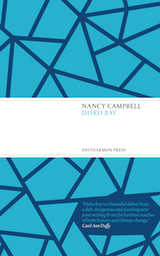Disko Bay
 There are more than seven words for winter in Greenlandic, and when you have read Nancy Campbell’s Disko Bay you’ll know why. The poet has worked as writer in residence for many ecological institutions and over her career has authored many non-fiction books – including How to Say ‘I Love You’ In Greenlandic: An Arctic Alphabet, which won the Birgit Skiöld Award.
There are more than seven words for winter in Greenlandic, and when you have read Nancy Campbell’s Disko Bay you’ll know why. The poet has worked as writer in residence for many ecological institutions and over her career has authored many non-fiction books – including How to Say ‘I Love You’ In Greenlandic: An Arctic Alphabet, which won the Birgit Skiöld Award.
Campbell’s debut, Disko Bay, is separated into the three sections: “Disko Bay”, “Ruin Island” and “Jutland”. “Disko Bay” is a meeting place for whalers, missionaries, scientists and shamans and the collection as such reads as a scattered compilation of poems. “Ruin Island” focuses on the legendary Greenlandic leader Qujaavaarssuk. “Jutland” reaches the northern points of Europe and brings Greenland into the context of a more well known history, offering the poet’s own translations of Anglo-Saxon riddles found in The Exeter Book.
Much of her poetry does not make “obvious” sense. Though Campbell’s scenes are simple as the nature and the lives they describe, they are doused in a mist of abstraction. Take the opening lines from the first poem “Umiarassaat / The Seal People”:
I watch four shadows pass the sun.
They are not men, those bearded ones
with fat, stooped heads and shining skin
aboard a boat with no beginning.
I am so close to seeing this scene yet cannot squint hard enough. Something is coming in from the water: a boat, not quite a boat, manned by not quite men. Her description of the boat with no beginning is jarring. It implies an endlessness leading out to the sea – indeed many of these lines produce the distinct impression of a void. I see it as an embodiment of the feeling one has looking out at the open ocean during twilight.
Description aside, the flow of the poem’s sound is just as almost understandable. The rhythm is found in the first line and follows steadily through the stanza as a simple iambic tetrameter. The couplet of “sun” and “one” sets up the rhyming structure. But then “beginning” interrupts both. In the notes Nancy Campbell tells us that the “Umiarissaat are the vindictive spirits of dead seals” who take revenge of hunters’ wives. Yet even without the context of the poem’s subject, that sense of mysticism and ominous danger already prevails. It is the perfect way to introduce this collection. The imagery and the melody of the poems tend to the uncanny valley, reproducing an emotional tone that I believe is akin to that at home in Greenland. It is beauty cut with a sense of doom.
In particular I noticed “Alagassaq / The Lesson”, as a description of the poetical voice being taught Kalaallisut (Greenlandic).
I pace my fingers round his neck and feel
his gorge rise – or is his swallowing
his tongue? He wants to teach me the word
for ‘welcome’. Suddenly, he’s trembling:
his larynx rumbles, then his breath is gone.
He asks me to remember those vibrations,
and, anxious as a nurse who takes a pulse,
touches my throat to judge its contortions.
Will I ever learn these soft uvulars?
Both the vulnerability rendered by physical contact – “I place my fingers round his neck’”- and the vulnerability of learning the language of another captures the intense intimacy between the voice and the land. We understand that she is an outsider wanting to become more intimate with the place, and that local folk are inviting her in by teaching her “the word for ‘welcome’”. But still, she has her reserve. How close she can ever be if she cannot learn “these soft uvulars”?.
Nancy Campbell’s Disko Bay is testament to the power of a poet borne by the extreme knowledge of her subject. I now know both what the Umiarassaat are, and the beautiful terror one has when witnessing them.
Andrew C. Rogers

Leave a Reply